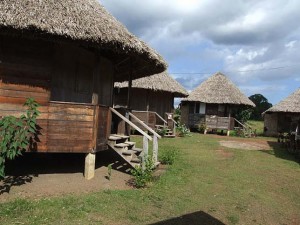
Acting tourism Minister Irfaan Ali has expressed the view that the tourism sector has the capacity to become the largest contributor to the Gross Domestic Product (GDP) as well as becoming the largest source of employment in Guyana.
Speaking at the 11th meeting of the National Competitiveness Council (NCC) held at the Office of the President on Thursday, the minister said tourism cross-cuts every other sector and all Guyanese need to embrace it as a source of national pride and patriotism.
He added that government is fully supportive of the sector and that work will begin shortly on a state-of-the-art, internationally accredited Hospitality Institute at the University of Guyana, where individuals from across the world can access high quality training in order to launch careers in the service and hospitality sectors.
Package deals
He also challenged the private sector to offer package deals and all-inclusive type events which would simultaneously benefit the local hotel, airline and entertainment sectors.
The meeting, the first for the year, was addressed by both government and private sector officials.
Finance Ministry, Project Cycle Management Division head Tarachand Balgobin; Institute of Applied Science and Technology (IAST) Director, Professor Suresh Narine; and University of Guyana (UG) Vice Chancellor, Professor Jacob Opadeyi made presentations on behalf of the government. They spoke on infrastructure, human resources and energy respectively.
Presenting on behalf of the private sector were Private Sector Commission (PSC) members Ramesh Dookoo, who spoke on non-Caribbean trade; Michael Correia, who spoke on aviation; and Captain Gerry Gouveia, who touched on tourism.
Gouveia highlighted several areas that priority should be given to including marketing, accessibility, nation branding, product development, pricing and safety and security.
He also commended the Tourism Ministry and the Tourism and Hospitality Association of Guyana (THAG), particularly in the areas of accessibility to Guyana and nation branding.
His private sector colleague Dookhoo said the small size of Guyana’s domestic economy and the importance of trade as a major source of economic growth and employment make trade a critical policy area.
Dookhoo outlined some of the challenges in the sector, including weak public-private dialogue on international trade negotiations, significant non-tariff barriers from trade partners, poor infrastructure, outdated import/export procedures and weak institutional structures.
Among the recommendations highlighted were the strengthening of trade agreements, introduction of the single window system, a certification laboratory for sanitary and phytosanitary (SPS) standards, improved monitoring of ports for illegal drugs, investments in infrastructure, particularly the road to Lethem and the deep water harbour, re-engineering of Go-Invest and challenging consulates and embassies/high commissions overseas to identify opportunities for trade.
Aviation policy
Correia recommended the drafting of a national aviation policy which should address inter alia airspace, the regulatory framework, market access for foreign carriers, efficient and user-friendly airports, international safety standards and regulations governing fuel and lubricants and systems for crisis and disaster management, including search and rescue.
Professor Opadeyi highlighted some of the challenges to human resources development, including the low level of adult literacy and numeracy, inadequate levels of performance in STEM subjects (science, technology, English language and mathematics), undertrained teachers and trainers and low Internet and information technology (IT) penetration due to high costs.
He outlined some of the proposed initiatives which included establishment of a National Education Planning Secretariat, support for online and distance education programmes, a strategic IT penetration programme, resuscitation of the National Science Council, increasing the minimum qualification for a high school teacher to be a first degree and inclusion of more foreign languages and exchange programmes in schools, particularly in Spanish and Portuguese.
He added that the University of Guyana (UG) plans to launch four online degree programmes by March 2014 so that prospective students do not have to physically attend the university.
He added that this would be particularly beneficial for prospective students who live far away from the two established UG campuses.
Professor Narine noted that all of the issues related to energy are well documented in the public domain. These included high costs for energy and the need to develop alternative sources of power generation.
Taskforce
He added that the major recommendation of his group was the need for a taskforce to be set up by President Ramotar for the purpose of drafting a national energy policy.
He suggested that the taskforce should include a wide cross-section of members from the government, private sector, opposition, academia, the Guyana Energy Agency and the Office of the Prime Minister.
Balgobin, the other government representative, outlined urgent short-term actions (within two years) and long-term actions (10 years).
The key short-term actions included upgrading of the Soesdyke/Linden Highway, the Bartica/Issano Road, the East Bank Essequibo Road and the Parika Backdam Road, which is to benefit from a Caribbean Development Bank (CDB) grant.
The longer-term actions include the Kurupukari/Mora Road, paving of the Linden/Lethem Road, developing an alternative road between the East Coast and West Coast of Demerara (WCD), reconstruction of the Demerara Harbour Bridge, dredging of the Demerara River, establishment of a container terminal on the WCD and a deep water harbour.
President Ramotar empowered the aviation group to continue their work by drafting the policy for review and adoption by Cabinet.
He lauded all the groups for the work done and proposed that all recommendations by the thematic working groups be adopted across the board and that the responsibility for monitoring and implementation of these policies will rest with the National Competitiveness Strategy Steering Committee chaired by Minister Ali.
This motion was unanimously agreed upon and carried by the NCC.



